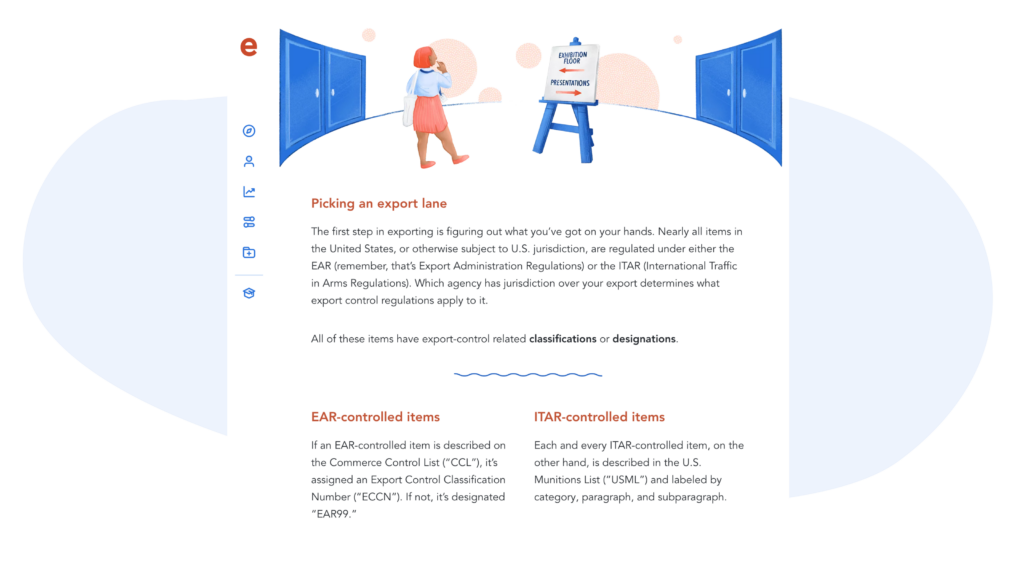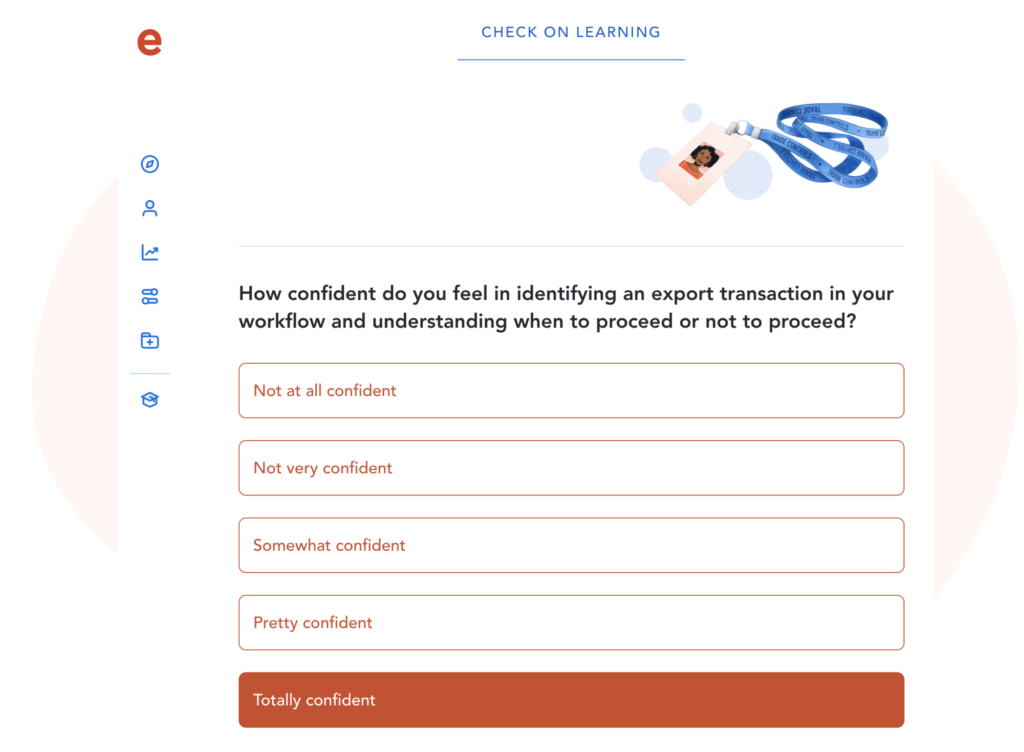Please join us in giving a warm welcome to the newest member of the all-star Ethena course lineup: U.S. Export Controls and Sanctions!
Here at Ethena, we love to make the burdensome effortless and the complicated intuitive (have you met our admin tools?), so transforming the high-stakes, high-complexity, many-acronymed world of U.S. trade regulations into a short, engaging course for the modern team — well, that was the kind of challenge that just called out to us.
Even if you aren’t boxing up items and shipping them off, you’re part of the world of trade controls — and a global world it is. Our course is designed with the intangible world of tech in mind:
- How the software products you make might count as exports
- What your employees need to know about US export controls and US sanctions law
- How to spot and escalate red-flag behaviors
So let’s dive into US export controls and sanctions. What they are, who enforces them, how they impact your workplace, and what you need to do: you name it, we’ll explain it.

What are U.S. export regulations and sanctions?
First, let’s get clear on what we’re talking about.
U.S. export regulations are the rules set down by the government for how U.S. companies can move U.S. items outside our borders. And guess what? Basically every aspect of that motion — from what’s a “U.S. company” to what’s a “U.S. item” to what movements count as “exports” — is more complicated than it sounds. (Which is precisely why one might want a bit of training on this topic. 😉)
U.S. sanctions bar U.S.-controlled persons (i.e. you and your company, presumably) from dealing in any way with certain prohibited countries, regions, governments, and even specific people. We call these parties sanctioned, and we’ll get into how to stay current on exactly whom you can’t do business with.

What is an export?
Exports are much more than just physical goods being packed up in the U.S. and shipped abroad. If you’re a U.S. tech company producing software that’s available for download in other countries, that’s an export too — and it’s subject to U.S. export control laws.
Exports made outside the U.S. can count too
Products can count as U.S. exports even if they’re made outside the U.S. by people from the U.S., made even partially out of U.S. tech, or when U.S. products are reexported from one non-U.S. country to another.
…And so does technical data given to foreign people within the U.S.
Did you know that a product doesn’t even have to leave the U.S. to be considered an export? If your company makes technical data like source code available to a foreign person within the United States — like an employee from another country, for example — that’s called a deemed export.
What are embargoes?
Embargoes are comprehensive bans on economic and even non-economic activity with a country or region. But these aren’t the whole story when it comes to sanctions, which can target something as broad as a country or as specific as a particular person.
What are U.S. sanctions?
U.S. sanctions are restrictions — or, in some cases, wholesale prohibitions — on dealing with certain countries, regions, governments, and persons. A “person” in this case could be an entity like a bank, a company, or an actual, individual person.
Why do companies need export compliance training?
Reason #1
Because it’s complicated. Export compliance training isn’t always required — but following U.S. export control laws definitely is. And the wide-ranging and deeply footnoted definitions of everything from export on down should be your first clue that training on these high-stakes regulations is key to making sure your employees actually understand their responsibilities and how all this applies to them.
Reason #2
And because it’s a legal issue. Non-compliance in the realm of export controls and sanctions is the opposite of no big whoops. (As in … a big whoops.) The consequences can be huge, from massive monetary penalties to severe reputational damage. The regulatory bodies governing these areas monitor transactions closely, and have been known to leverage large fines — with tech companies often caught by surprise.
Speaking of regulatory bodies…
What are the regulatory bodies involved with export compliance training?

What is OFAC?
OFAC stands for Office of Foreign Assets Control, an office of the U.S. Department of the Treasury. OFAC is the regulatory body in charge of administering and enforcing U.S. sanctions. Our training delves into all the sanctions under OFAC’s purview, from the comprehensive to the list-based.
What is ITAR?
ITAR is the International Traffic in Arms Regulations, which regulate the export, reexport, and retransfer of defense articles and related technical data, as well as the provision of defense services. ITAR-controlled items (including ITAR-controlled technical data) are heavily regulated, with prior licensing often needed in order to export, re-export (as in: transfer from one non-U.S. country to another), or re-transfer them.
Typically, if you’re conducting ITAR-related activities, you’re required to register with the Directorate of Defense Trade Controls as part of ITAR compliance.
What is EAR?
If your exports aren’t regulated specifically under ITAR, you’ll more typically be dealing with EAR: the Bureau of Industry and Security’s Export Administration Regulations. These regulations cover the export, re-export, and in-country transfer of commercial, dual-use, and certain defense-related items and related technology.
Do you need an export license?
Exporting is all about knowing what you’re sending and where you’re sending it. Someone questions to ask yourself:
- Is your item sensitive enough in its characteristics to fall on the CCL (Commerce Control List) and get an ECCN (Export Control Classification Number)?
- Does your transaction involve a prohibited end user or end use?
- Is it destined for an embargoed territory?
If you answered yes to any of the above, you may need a license from BIS (The Bureau of Industry and Security).
Which employees need export control training?
You may have gathered by now — or maybe you come to us already knowing all too well — that this stuff is specific, complex, and richer in lists than the most dedicated bullet journaler. Thankfully, knowing how to use an OFAC sanctions list and keep your exports in EAR compliance probably isn’t something everyone on your team needs to stay on top of.
But it’s relevant to more pieces of the organization than you might think. Leadership, Sales, and CS — anyone who’s doing business with outside parties — all need to be able to recognize a sanctioned party or an antiboycott red flag. And anyone who helps distribute the product — think pushing out software updates in patches or allowing for its download — is potentially exporting. So the product or engineering side of the house might benefit from export controls training too.
Why export training matters
Is national security too lofty a reason? In all seriousness, we live in an evolving political world, and your company needs compliance training that keeps you up to speed. Trade controls is a hefty topic, and definitely not one you can expect your employees to know like the back of their hand. Effective and engaging training on export controls and sanctions is the best way of presenting:
- OFAC regulations
- ITAR restrictions
- EAR designations
And all the rest of the regulatory alphabet soup in a way that your employees can understand in the context of their real work.
What topics are included in Ethena’s export controls training?

Export training courses have a lot of regulatory territory to cover — here are some of the topics we can handle for your export compliance program:
- What is an export?
- Deemed exports
- EAR and ITAR
- Export licenses, classification, and ECCNs
- Embargoes and comprehensive sanctions
- OFAC lists, including the SDN List and SSI List
- General and specific OFAC licenses
- Antiboycott laws
- Boycotting red flags
- Consequences of noncompliance
- When to stop or proceed with an export transaction
What makes Ethena’s U.S. Exports Training stand out?
You and your company can learn export compliance — and have fun doing it. Here are a couple ways Ethena’s U.S. Export Controls and Sanctions training stands head and shoulders above the rest.
1. We save you time
No more chasing down stragglers, no more updating spreadsheets held together with scotch tape and a prayer, no more manual updating by you at all — our platform just works. Set your training to go out to the people who need it, when they need it, and keep easy track of their progress in our best-in-class admin hub.
2. We’re easy to set up
We play nice with many popular software integrations you’re organization is probably already using. You can get set up in as little as five minutes, and start assigning and sending out training to your company with just a few clicks.
3. 1 million happy customers
Would it shock you to learn that online export compliance training is often pretty boring? At Ethena, we know that boring training is training that won’t stick — and on a high-stakes topic like this, that won’t do. We make training that makes learners say, I never knew this topic could be interesting. And we have the 1 million positive reviews to prove it.
Get engaging US export compliance training today
Trade controls live at the busy intersection of highly important and highly complicated. Your employees need training on U.S. export controls and sanctions law that will meet them in their real workplace, at their real level of expertise, and stick with them when they’ve done it. Request a sample of our U.S. Export Controls and Sanctions training today to see it for yourself.
Or if you’re ready to launch the training that’ll get the job done: Book a demo today.










